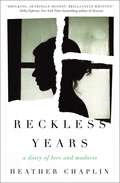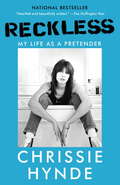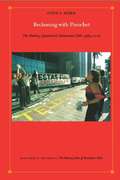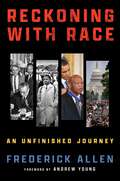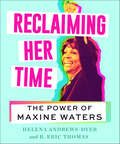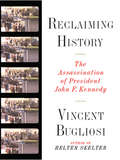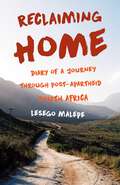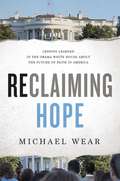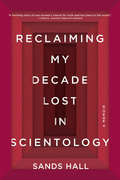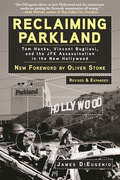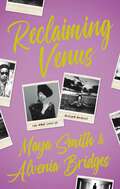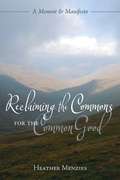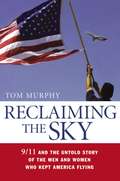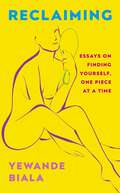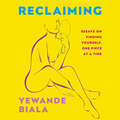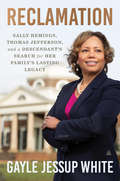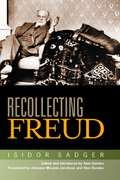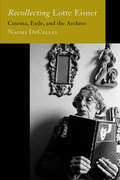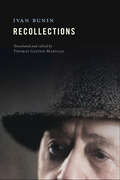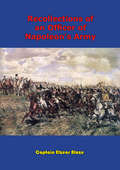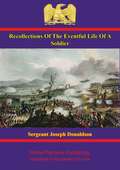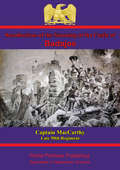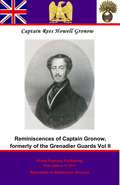- Table View
- List View
Reckless Years: A Diary of Love and Madness
by Heather ChaplinIn this page-turning memoir, a woman tries to reinvent her life after divorce and discovers that sometimes finding yourself is not all it’s cracked up to be.Trapped in a dissatisfying marriage for nearly a decade, New York journalist Heather Chaplin finally summons the courage to leave. On her own, she finds herself intoxicatingly free, pursuing adventure, and juggling romance on two continents in multiple cities. She contemplates the meaning of life; she falls for a handsome Irishman. But as the adventures progress, Chaplin’s own reckless choices send her spiraling downward—and toward a reckoning she’s avoided all her life. Pulled from Chaplin’s own diaries, Reckless Years is a raw, propulsive debut: unfailingly profound and impossible to put down.
Reckless: My Life as a Pretender
by Chrissie HyndeChrissie Hynde, for nearly four decades the singer/songwriter/ undisputed leader of the Pretenders, is a justly legendary figure. Few other rock stars have managed to combine her swagger, sexiness, stage presence, knack for putting words to music, gorgeous voice and just all-around kick-assedness into such a potent and alluring package. From "Tatooed Love Boys" and "Brass in Pocket" to "Talk of the Town" and "Back on the Chain Gang," her signature songs project a unique mixture of toughness and vulnerability that millions of men and women have related to. A kind of one- woman secret tunnel linking punk and new wave to classic guitar rock, she is one of the great luminaries in rock history. Now, in her no-holds-barred memoir Reckless, Chrissie Hynde tells, with all the fearless candor, sharp humor and depth of feeling we've come to expect, exactly where she came from and what her crooked, winding path to stardom entailed. Her All-American upbringing in Akron, Ohio, a child of postwar power and prosperity. Her soul capture, along with tens of millions of her generation, by the gods of sixties rock who came through Cleveland--Mitch Ryder, David Bowie, Jeff Back, Paul Butterfield and Iggy Pop among them. Her shocked witness in 1970 to the horrific shooting of student antiwar protestors at Kent State. Her weakness for the sorts of men she calls "the heavy bikers" and "the get-down boys." Her flight from Ohio to London in 1973 essentially to escape the former and pursue the latter. Her scuffling years as a brash reviewer for New Musical Express, shop girl at the Malcolm McLaren and Vivienne Westwood boutique 'Craft Must Wear Clothes But The Truth Loves To Go Naked', first-hand witness to the birth of the punk movement, and serial band aspirant. And then ,at almost the last possible moment, her meeting of the three musicians who comprised the original line-up of The Pretenders, their work on the indelible first album "The Pretenders," and the rocket ride to "Instant" stardom, with all the disorientation and hazards that involved. The it all comes crashing back down to earth with the deaths of lead guitarist James Honeyman Scott and bassist Peter Farndon, leaving her bruised and saddened, but far from beaten. Because Chrissie Hynde is, among other things, one of rock's great survivors. We are lucky to be living in a golden age of great rock memoirs. In the aptly titled Reckless, Chrissie Hynde has given us one of the very best we have. Her mesmerizing presence radiates from every line and page of this book.From the Hardcover edition.
Reckoning with Pinochet: The Memory Question in Democratic Chile, 1989-2006
by Steve J. SternReckoning with Pinochet is the first comprehensive account of how Chile came to terms with General Augusto Pinochet's legacy of human rights atrocities. An icon among Latin America's "dirty war" dictators, Pinochet had ruled with extreme violence while building a loyal social base. Hero to some and criminal to others, the general cast a long shadow over Chile's future. Steve J. Stern recounts the full history of Chile's democratic reckoning, from the negotiations in 1989 to chart a post-dictatorship transition; through Pinochet's arrest in London in 1998; the thirtieth anniversary, in 2003, of the coup that overthrew President Salvador Allende; and Pinochet's death in 2006. He shows how transnational events and networks shaped Chile's battles over memory, and how the Chilean case contributed to shifts in the world culture of human rights. Stern's analysis integrates policymaking by elites, grassroots efforts by human rights victims and activists, and inside accounts of the truth commissions and courts where top-down and bottom-up initiatives met. Interpreting solemn presidential speeches, raucous street protests, interviews, journalism, humor, cinema, and other sources, he describes the slow, imperfect, but surprisingly forceful advance of efforts to revive democratic values through public memory struggles, despite the power still wielded by the military and a conservative social base including the investor class. Over time, resourceful civil-society activists and select state actors won hard-fought, if limited, gains. As a result, Chileans were able to face the unwelcome past more honestly, launch the world's first truth commission to examine torture, ensnare high-level perpetrators in the web of criminal justice, and build a public culture of human rights. Stern provides an important conceptualization of collective memory in the wake of national trauma in this magisterial work of history.
Reckoning with Race: An Unfinished Journey
by Frederick AllenIn his fifty-year career as an award-winning journalist, CNN commentator, and author of multiple books, Rick Allen has had a front-row seat on dramatic change in race relations in America. In this collection of eighteen essays, he explores his ongoing efforts to understand the struggle of black and white Americans to navigate a shared history at once wicked and intimate, full of love and hate, as they seek to level an uneven playing field. Allen examines issues from the era of Reconstruction through Jim Crow, the Civil Rights movement, the rhythms of resistance and progress, into today&’s contentious debates over redlining, reparations, and critical race theory. Starting as a reporter with the Atlanta Constitution in 1972, Allen got to know and befriend legendary black political figures including Julian Bond, John Lewis, Andy Young, Hosea Williams, Maynard Jackson, Jesse Jackson, and Daddy King, the father of Martin Luther King, Jr. He also encountered ardent white segregationists, some of whom saw the light and others who took their racism to the grave. Drawing on his experience covering politics, he examines presidents from LBJ and Jimmy Carter to Obama and Trump. He explores the symbolism of Confederate flags, the controversy over Uncle Remus, the election of Atlanta&’s first black mayor, Maynard Jackson, and the tragic case of the Atlanta Child Murders. He has had first-hand encounters with white supremacy and violent black protest alike. Throughout his essays, Allen is candid about his own shortcomings as a white native Northerner learning gradually about the complexities of race in his adoptive South. The essays highlight his continuing journey toward understanding the forces that both hinder and promote equality and harmony between the races.
Reclaimers
by Ana Maria SpagnaFor most of the past century, Humbug Valley, a forest-hemmed meadow sacred to the Mountain Maidu tribe, was in the grip of a utility company. Washington's White Salmon River was saddled with a fish-obstructing, inefficient dam, and the Timbisha Shoshone Homeland was unacknowledged within the boundaries of Death Valley National Park. Until people decided to reclaim them. In this book, Ana Maria Spagna drives an aging Buick up and down the long strip of West Coast mountain ranges - the Panamints, the Sierras, the Cascades - and alongside rivers to meet the people, many of them wise women, who persevered for decades with little hope of success to make changes happen.
Reclaiming Her Time: The Power of Maxine Waters
by R. Eric Thomas Helena Andrews-DyerNamed a Best Political Book of the Year by The AtlanticIn the tradition of Notorious RBG, a lively, beautifully designed, full-color illustrated celebration of the life, wisdom, wit, legacy, and fearless style of iconic American Congresswoman Maxine Waters.“Let me just say this: I’m a strong black woman, and I cannot be intimidated. I cannot be undermined. I cannot be thought to be afraid of Bill O’Reilly or anyone.”—Maxine Waters To millions nationwide, Congresswoman Maxine Waters is a hero of the resistance and an icon, serving eye rolls, withering looks, and sharp retorts to any who dare waste her time on nonsense. But behind the Auntie Maxine meme is a seasoned public servant and she’s not here to play. Throughout her forty years in public service and eighty years on earth, U.S. Representative for California’s 43rd district has been a role model, a crusader for justice, a game-changer, a trailblazer, and an advocate for the marginalized who has long defied her critics, including her most vocal detractor, Donald J. Trump. And she’s just getting started. From her anti-apartheid work and support of affirmative action to her passionate opposition to the Iraq War and calls to hold Trump to account, you can count on Auntie Maxine to speak truth to power and do it with grace and, sometimes, sass. As ranking member of the House Financial Services Committee and one of the most powerful black women in America, she is the strong, ethical voice the country has always needed, especially right now.Reclaiming Her Time pays tribute to all things Maxine Waters, from growing up in St. Louis “too skinny” and “too black,” to taking on Wall Street during the financial crisis and coming out on top in her legendary showdowns with Trump and his cronies. Featuring inspiring highlights from her personal life and political career, beloved memes, and testimonies from her many friends and fans, Reclaiming Her Time is a funny, warm, and admiring portrait of a champion who refuses to stay silent in the face of corruption and injustice; a powerful woman who is an inspiration to us all.
Reclaiming History: The Assassination of President John F. Kennedy
by Vincent BugliosiFor fifty years the truth about the assassination of President John F. Kennedy has been obscured. This book releases us from a crippling distortion of American history. At 1:00 p.m. on November 22, 1963, President John F. Kennedy was pronounced dead, the victim of a sniper attack during his motorcade through Dallas. That may be the only fact generally agreed upon in the vast literature spawned by the assassination. National polls reveal that an overwhelming majority of Americans (75%) believe that there was a high-level conspiracy behind Lee Harvey Oswald. Many even believe that Oswald was entirely innocent. In this continuously absorbing, powerful, ground-breaking book, Vincent Bugliosi shows how we have come to believe such lies about an event that changed the course of history. The brilliant prosecutor of Charles Manson and the man who forged an iron-clad case of circumstantial guilt around O. J. Simpson in his best-selling Outrage Bugliosi is perhaps the only man in America capable of writing the definitive book on the Kennedy assassination. This is an achievement that has for years seemed beyond reach. No one imagined that such a book would ever be written: a single volume that once and for all resolves, beyond any reasonable doubt, every lingering question as to what happened in Dallas and who was responsible. There have been hundreds of books about the assassination, but there has never been a book that covers the entire case, including addressing every piece of evidence and each and every conspiracy theory, and the facts, or alleged facts, on which they are based. In this monumental work, the author has raised scholarship on the assassination to a new and final level, one that far surpasses all other books on the subject. It adds resonance, depth, and closure to the admirable work of the Warren Commission. Reclaiming History is a narrative compendium of fact, forensic evidence, reexamination of key witnesses, and common sense. Every detail and nuance is accounted for, every conspiracy theory revealed as a fraud on the American public. Bugliosi's irresistible logic, command of the evidence, and ability to draw startling inferences shed fresh light on this American nightmare. At last it all makes sense.
Reclaiming Home: Diary of a Journey Through Post-Apartheid South Africa
by Lesego MalepeReclaiming Home is the diary of Lesego Malepe&’s travels in South Africa in 2004, the 10th anniversary of South Africa&’s democracy. The book begins with Malepe taking the bus from Pretoria, where she grew up, to Cape Town, where she visits Robben Island—the prison where her brother served a life sentence during apartheid days. She interrupts her travels to return to Pretoria, where she attends the ceremony marking the official settlement of land claims for her parents&’ property and her grandmother&’s property in Kilnerton, Pretoria, which were confiscated by the apartheid government when Malepe was four, forcing her family—along with the rest of their community—to move to Mamelodi township for Africans. Over the course of her travels, Malepe traverses much of her home country, visiting locales including Pietermaritzburg, Durban, Port Elizabeth, Thohoyandou, the University of Venda, and Giyani. Ultimately, hers is a sprawling, revealing journey that illuminates the ways South Africa has changed—and the ways it has remained the same—since the end of apartheid.
Reclaiming Hope: Lessons Learned in the Obama White House About the Future of Faith in America
by Michael R. Wear"An important and extremely timely book...Get it, read it, and talk to others about it." --Timothy Keller, author of Reason for God "A warm, engaging read of the author’s experience with faith, politics, and the intersection (and sometimes collision) of the two. Reclaiming Hope is an important contribution in this age of religious and political polarization." --J.D. Vance, author of Hillbilly Elegy Before he had turned twenty-one, Michael Wear found himself deep inside the halls of power in the Obama administration as one of the youngest-ever White House staffers. Appointed by the president in 2008 to the Office of Faith-based and Neighborhood Partnerships and later directing faith outreach for the president’s 2012 re-election campaign, Wear threw himself wholeheartedly into transforming hope into change, experiencing first-hand the highs and lows of working as a Christian in government. In this unvarnished account of faith inside the world’s most powerful office, Wear gives unprecedented insight into the most controversial stories of the last eight years, from the president’s change of position on gay marriage and the politicization of religious freedom to the administration’s failure to find common ground on abortion and the bitter controversy over who would give the benediction at the 2012 inauguration. Wear also reveals the behind-the-scenes struggles behind some of the administration’s signature achievements, including the adoption tax credit and making human trafficking a presidential priority. And he offers a rare window onto the ways the president himself viewed the role of faith in politics. More than a memoir of the Obama administration, Reclaiming Hope is also a passionate call for faith in the public square, particularly for Christians to see politics as a means of loving one’s neighbor and of pursuing justice for all while promoting racial reconciliation and fighting for religious freedom for people of all faiths. At a time when large numbers of thoughtful Christians are arguing for withdrawal from participation in public institutions, Wear’s experience at the white-hot center of civic life shows how and why Christians must be involved in every aspect of cultural life—even if failures seem to outnumber successes—while working on behalf of the nation’s common good.
Reclaiming My Decade Lost in Scientology: A Memoir
by Sands Hall"With its keen attention to the language and tactics of the church, Hall’s memoir is unique among the assortment of Scientology reports and exposés, offering insight into the certainties that its subjects gain." —The NationIn the secluded canyons of 1980s Hollywood, Sands Hall, a young woman from a literary family, strives to forge her own way as an artist. But instead, Hall finds herself increasingly drawn toward the certainty that Scientology appears to offer. Her time in the Church includes the secretive illness and death of its founder, L. Ron Hubbard, and the ascension of David Miscavige. In this compelling memoir, Hall reveals what drew her into the religion—with its intrigues and unique contemporary vision—and how she came to confront its darker sides and finally escape."Some of the most penetrating, illuminating prose about how an educated and skeptical person could get so deeply into, and then struggle to escape, what everyone around her warned was a dangerous cult . . . brilliant." —The Underground Bunker"If it is Scientology's offer of a life with meaning that hauls her in . . . it is its approach to meaning that keeps her . . . Hall's fascination with this is palpable." —Camille Ralphs, The Times Literary Supplement
Reclaiming Parkland: Tom Hanks, Vincent Bugliosi, and the JFK Assassination in the New Hollywood
by Oliver Stone James DiEugenioReclaiming Parkland details the failed attempt of Academy Award-winning actor Tom Hanks and producer Gary Goetzman to make Vincent Bugliosi’s mammoth book about the Kennedy assassination, Reclaiming History, into a miniseries. It exposes the questionable origins of Reclaiming History in a dubious mock trial for cable television, in which Bugliosi played the role of an attorney prosecuting Lee Harvey Oswald for murder, and how this formed the basis for the epic tome. Author James DiEugenio details the myriad problems with Bugliosi’s book, and explores the cooperation of the mainstream press in concealing many facts during the publicity campaign for the book and how this lack of scrutiny led Hanks and Goetzman?cofounders of the production company Playtone?to purchase the film rights. DiEugenio then shows how the film adapted from that book, entitled Parkland, does not resemble Bugliosi’s book and examines why. This book reveals the connections between Washington and Hollywood, as well as the CIA influence in the film colony today. It includes an extended look at the little-known aspects of the lives and careers of Bugliosi, Hanks, and Goetzman. Reclaiming Parkland sheds light on the Kennedy assassination, New Hollywood, and the political influence on media in America.
Reclaiming Venus: The Many Lives of Alvenia Bridges
by Alvenia Bridges Dr Maya Angela Smith"Reclaiming Venus: The Many Lives of Alvenia Bridges" chronicles the remarkable journey of Alvenia Bridges from segregated Kansas to the heights of fashion and rock 'n' roll, breaking barriers and rubbing shoulders with legends. It is a powerful testament to resilience and the pursuit of dreams against all odds. "Reclaiming Venus: The Many Lives of Alvenia Bridges" chronicles the remarkable journey of Alvenia Bridges from segregated Kansas to the heights of fashion and rock 'n' roll, breaking barriers and rubbing shoulders with legends. It is a powerful testament to resilience and the pursuit of dreams against all odds. Growing up in the 1950s in segregated Kansas, Alvenia Bridges dreamed of leaving home and seeing the world. Despite her destructive home life and the racially oppressive environment of her childhood, Alvenia graduated high school, left for L.A., and successfully navigated the predominantly white and male-run worlds of fashion and 70s and 80s Rock and Roll. From a chance encounter with race car driver John Von Neumann that jump-started her modeling career in Europe to her years working for famous musicians, Alvenia's unflappable resolve left her impressively mobile in the face of societal constraints. Alvenia had much to share with the world as she crossed paths and worked with a wide variety of people in the music and fashion industries, from long-term working relationships with Bill Graham, Roberta Flack, and the Rolling Stones, to momentary yet extraordinary encounters with Jimi Hendrix, John Lennon, Prince, and Tina Turner, to personal and professional interactions with Jerry Hall, Antonio Lopez, and Francesco Scavullo. Alvenia's remarkable life forged a path through glass ceilings and blocked doors that reads like a work of fiction.
Reclaiming the Commons for the Common Good
by Heather MenziesCommoning was a way of life for most of our ancestors. In Reclaiming the Commons for the Common Good, author Heather Menzies journeys to her roots in the Scottish Highlands, where her family lived in direct relation with the land since before recorded time.Beginning with an intimate account of unearthing the heritage of the commons and the real tragedy of its loss, Menzies offers a detailed description of the self-organizing, self-governing, and self-informing principles of this nearly forgotten way of life, including its spiritual practices and traditions. She then identifies pivotal commons practices that could be usefully revived today. A final "manifesto" section pulls these facets together into a unified vision for reclaiming the commons, drawing a number of current popular initiatives into the commoning frame, such as local food security, permaculture, and the Occupy Movement.An engaging memoir of personal and political discovery, Reclaiming the Commons for the Common Good combines moving reflections on our common heritage with a contemporary call to action, individually and collectively; locally and globally. Readers will be inspired by the book's vision of reviving the commons ethos of empathy and mutual respect, and energized by her practical suggestions for connection people and place for the common good.Heather Menzies is an award-winning writer and scholar and member of the Order of Canada. She is the author of nine books, including Whose Brave New World? and No Time.
Reclaiming the Sky: 9/11 and the Untold Story of the Men and Women Who Kept America Flying
by Tom Murphy"When asked about the death toll from the September 11th attacks, New York City Mayor Rudy Giuliani stated simply and eloquently that the number would likely be ""more than any of us can bear."" He was right, of course. Yet often obscured in that inconceivable number is the fact that among those who died, as well as those who lived and continue to live, were many thousands of aviation professionals with names, families, lives, and individual experiences that are an important part of the 9/11 story. Some five years later, these stories are being told for the first time in Reclaiming the Sky. In the pages of this book, you will meet some of the people whose hard work propels a critical social and economic force -- the aviation industry -- and who on the morning of September 11th, were suddenly thrust into front-line positions in the battle to put our nation back on its feet. For many of these men and women and their families, the pain and after-effects of 9/11 are exceptionally acute, but their stories will serve as touchpoints for the thousands of people whose journey to closure is still ongoing. This powerful and ultimately uplifting book not only honors the heroes of September 11th, it also offers common ground to those in search of meaning and purpose in a changed world -- both in and outside of the air travel industry -- and gives Americans in all walks of life something they still seek five years after 9/11: the courage and strength to move forward."
Reclaiming: Essays on finding yourself one piece at a time
by Yewande BialaReclaiming is a brilliantly written and thought-provoking book. Through amazing story telling, Yewande highlights the richness in her culture that so many other black women can relate to. It was extremely gripping right from beginning. -- Oloni'This book highlights the topics and issues we still face in our society daily, including some that I've struggled with myself. I think it's hugely important we keep having these conversations and this book certainly helps do just that.' -- Olivia Bowen'Reclaiming is comforting, yet inspiring. Yewande has admirably opened up about her experiences growing up and facing difficulties such as colourism and mental health problems, how she's so bravely over come them and found her voice. I whole heartedly recommend this book to anyone mixed up in this complex generation looking for a relatable, authentic and aspirational read.' -- Demi Jones'I absolutely loved it. I think it's clear to anyone who's read Yewande's earlier essay that she's a phenomenal writer and talent, and this is an incredible debut. Empowering, instructive, loving & honest...the kind of text that makes me excited to be a reader' -- Beth McColl'I'm so proud of the strong, intelligent woman Yewande is. She is using her platform and own experiences to educate, inspire, empower and to help others!' -- Amy Hart'A beautiful book - very relatable... a beautiful form of art.' -- Murad Merali'Reclaiming is more than just a book title. It's a statement. It's power. It's an announcement. It's a force I feel Yewande is making on behalf of all men and women of colour. Thank you Yewande.' -- Rachel Finni_____________________________________________________I am more than enough, and I am perfect with all my imperfections.In 2021, Yewande Biala wrote a searing viral essay on the debilitating effects of having your name constantly mispronounced or changed.From the incredible response to the essay, it was clear that there are still so many conversations to be had around the way that we as a society respond to each other, and the direct effect it is having on our sense of self. Reclaiming consists of interlinked essays covering a wide breadth of topics from struggling with your body image and mental health to navigating social media and dating apps without damaging your self-esteem.Each essay covers a different topic, affirming that maintaining your sense of self in a world that is not supportive of you is difficult, but not impossible. Nuanced, distinctly sharp, and full of wit, Reclaiming holds a mirror up to us all, and encourages us to like what we see.
Reclaiming: Essays on finding yourself one piece at a time ‘Yewande offers piercing honesty… a must-read book for anyone who has been on social media.’- The Skinny
by Yewande BialaRECLAIMING will cover a wide breadth of topics from the specific microaggressions black women encounter on dating apps to navigating a career that may seem impossible. Every step of Yewande's writing affirms that maintaining your sense of self in a world that is not supportive of you is difficult, but not impossible. The audiobook will be a thought provoking, sensitive, challenging and deeply moving collection of essays covering everything from identity to love and career choices, published in May 2022.RECLAIMING will serve as an inspiring love letter for anyone who has ever felt out of place, but strives to find success in every aspect of their lives.(P) 2022 Hodder & Stoughton Limited
Reclamation: Sally Hemings, Thomas Jefferson, and a Descendant's Search for Her Family's Lasting Legacy
by Gayle Jessup WhiteA Black descendant of Thomas Jefferson and Sally Hemings’ family explores America’s racial reckoning through the prism of her ancestors—both the enslaver and the enslaved. <p><p> Gayle Jessup White had long heard the stories passed down from her father’s family, that they were direct descendants of Thomas Jefferson—lore she firmly believed, though others did not. For four decades the acclaimed journalist and genealogy enthusiast researched her connection to Thomas Jefferson, to confirm its truth once and for all. After she was named a Jefferson Studies Fellow, Jessup White discovered her family lore was correct. Poring through photos and documents and pursuing DNA evidence, she learned that not only was she a descendant of Jefferson on his father’s side; she was also the great-great-great-granddaughter of Peter Hemings, Sally Hemings’s brother. <p><p> In Reclamation she chronicles her remarkable journey to definitively understand her heritage and reclaim it, and offers a compelling portrait of what it means to be a black woman in America, to pursue the American dream, to reconcile the legacy of racism, and to ensure the nation lives up to the ideals advocated by her legendary ancestor.
Recollecting Freud
by Isidor SadgerAvailable here for the first time in English, this eyewitness account by one of Freuds earliest students has been rediscovered for twenty-first century readers. Isidor Sadgers recollections provide a unique window into the early days of the psychoanalytic movement the internecine and ideological conflicts of Freuds disciples. They also illuminate Freuds own struggles: his delight in wit, his attitudes toward Judaism, and his strong opinions concerning lay, non-medical analysts. As a student, Sadger attended Freuds lectures from 1895 through 1904. Two years later Freud nominated Sadger to his Wednesday Psychological Society (later called the Viennese Psychoanalytic Society). Sadger, however, was not part of Freuds inner circle, but more a participant observer of the early years of the psychoanalytic movement and of Freud as teacher, therapist, and clinician. Sadger was considered one of the most devoted followers of Freud and hoped to become one of Freuds "favorite sons. " At the First Psychoanalytic Congress held in Salzburg in 1908, Sadger was chosen to be one of the principal speakers along with Freud, Jones, Alder, Jung, Prince, Rifkin, Abraham, and Stekel, an honor that bespeaks Sadgers early role in the movement. But Freud and many of his disciples were also openly critical of Sadgers work, calling it at various times overly simplistic, unimaginative, reductionist, orthodox, and rigid. In 1930 Sadger published his memoir, Sigmund Freud: Persönliche Erinnerungen. With the rise of Nazism and World War II, the book became lost to the world of psychoanalytic history. Recently, Alan Dundes learned of its existence and mounted a search that led him around the world to one of the few extant copies in a research library in Japan. The result of his fascinating quest is Recollecting Freud, a long-lost personal account that provides invaluable insights into Freud and his social, cultural, and intellectual context.
Recollecting Lotte Eisner: Cinema, Exile, and the Archive (Feminist Media Histories #3)
by Naomi DeCellesRecollecting Lotte Eisner provides the first in-depth examination of the remarkable transnational career of film journalist, archivist, and historian Lotte Eisner (1896–1983). From her early years as a film critic in interwar Berlin to her escape from prison in occupied France and from her role as chief curator at the Cinémathèque française to that as the mythic "collective conscience" of New German Cinema, Eisner was a prolific writer and lecturer and a pivotal voice in early film and media studies. Situated at the juncture of feminist media historiography and disciplinary intellectual history, this groundbreaking book is based on extensive multilingual archival research and the excavation of a rich corpus of previously overlooked materials. Introducing samples of Eisner's writing in translation, this volume makes some of the most important contributions of a foundational scholar in the field of film studies accessible for the first time to an English-language readership.
Recollections (NIU Series in Slavic, East European, and Eurasian Studies)
by Ivan BuninIn this edited translation of famed writer Ivan Bunin's Recollections translator Thomas Gaiton Marullo provides an intimate look at leading political, social, cultural, and literary figures from late imperial Russia, through the First World War and the revolutions of 1905 and 1917 to the birth of the Russian diaspora and the rise of the Soviet state. Through engaging, colorful, and often idiosyncratic vignettes, Bunin (1870–1953) details his admiration for Leo Tolstoy, Anton Chekhov, Sergei Rachmaninov, and Fyodor Chaliapin. He shares his love-hate relationships with Maxim Gorky, Alexei Tolstoy, and Alexander Kuprin. In addition, Marullo's translation reveals Bunin's hatred of avant-gardists, particularly Vladimir Mayakovsky, as well as his thoughts and experiences on war, revolution, and exile. Bunin's work led, in the end, to his bittersweet reception of the Nobel Prize in Literature (1933) in Stockholm, making him the first Russian and the first writer in exile ever to receive this award. Recollections reveals the author's feelings toward this unprecedented event. Bunin's Recollections stands not only as a stark summa of his passage through literature and life but also as an equally bold apologia as to his place in both.
Recollections Of An Officer Of Napoleon’s Army
by Captain Elzéar Blaze E Jules MérasMany memoirs of the Napoleonic period are recounting, more or less interesting dependant on the author, of the events of their service interspersed by anecdotes of interesting events, Elzéar Blaze eschewed that style of reminiscence and left a singular view of his time in the Grande Armée. His memoirs are highly stylised, divided into the 'themes' of military life, and eruditely written by an educated man of the era, who combined wit with an eye for an anecdote. He covers the different aspects of his military career with amusing stories and vivid recollections of the men with which he served, a number of the generals who commanded them, and the enemies that they were fought and were billeted on if they were in occupation; he covers the school of the Vélites, his military training, the marches, camp-life, bivouacs, active campaigning, and the battles fought under Napoleon. Blaze, like his brother, sought out a military life under the eagles of Napoleon, he enlisting in the Vélites of the Imperial Guard, his brother into the medical services of the army. The Vélites were founded as part of Napoleon's further, ultimately unsuccessful, attempts to sway the aristocracy to fall in line and support his rule. The military tutelage in the Vélites was to be supported by private means, which translated into their ranks being filled with the scions of the nobility and wealthy bourgeoisie. Blaze fought as part of Napoleon's invincibles from 1807 until the end of the empire, but continued his service under the returned Bourbons and retired as captain in 1828.An interesting and different view of the Grande Armée.
Recollections Of The Eventful Life Of A Soldier: By The Late Joseph Donaldson, Sergeant In The Ninety-Fourth Scots Brigade
by Sergeant Joseph DonaldsonDonaldson "was born in Glasgow, where his father was employed by a mercantile house. With some school companions he ran away to sea and made a voyage to the West Indies, which disenchanted him of a sea life, and he returned home and was sent back to school by his father. Early in 1809 he again ran away, and without communicating with his friends enlisted in the old 94th (Scotch, or Scots, brigade). He accompanied the regiment to Jersey, then to Spain, where it took part in the desperate defence of Fort Matagorda during the siege of Cadiz, and afterwards was with Picton's division in the principal battles and sieges in the Peninsula from 1811 to 1814" (Oxford DNB). He "was an intelligent man, and possessed a wider set of interests than was common in the ranks, so that it is always worthwhile to look up his notes and observations. His description of the horrors of Masséna's retreat from Portugal in 1811 is a very striking piece of lurid writing . . . The Eventful Life of a Soldier is well worth reading" (Oman, Wellington's army p. 30).Author -- Sergeant Joseph Donaldson (1793-1830)Text taken, whole and complete, from the edition published in Philadelphia, G. B. Zieber & co., 1845.Original Page Count - vii, and 231 p.Illustrations -- 9 maps and plans.
Recollections Of The Storming Of The Castle Of Badajos
by Captain James MaccarthyThe situation for the Duke of Wellington and his British and Portuguese troops in 1812 was somewhat perilous. Although they had chased Masséna and his French Legions from Spain, overwhelming numbers of enemy troops were still in Spain despite being scattered through the provinces. For Wellington to move forward and take the fight to the enemy, he would have to take the two border fortresses of Ciudad Rodrigo and Badajos, and do so quickly before the bickering French marshals united against him. After capturing Ciudad Rodrigo in a bloody but short siege, the Iron Duke turned his attention on the much more formidable fortress of Badajos, a fortress that they had failed to take before.The few trained Allied engineers were bolstered by volunteer officers like the author Captain MacCarthy, who undertook the dangerous work of the engineers. However, a lack of artillery and shot meant that the task would be exceptionally difficult, and pressed by time Wellington orders an early assault by the best of his infantry over barely practicable breeches. As a diversion, he also orders an attempt to capture the castle of Badajos by escalade - the author himself being part of this diversionary effort. In the event, the breeches prove to be impregnable and after repeated murderous attempts, the defences of Badajos are only breached by the ladder borne assault on the castle.Captain MacCarthy's short narrative is vividly written filled with the blood and shot of the siege and the castle's final capture.
Recollections and Anecdotes; being a second series of Reminiscences of the Camp, the Court, and the Clubs. (Reminiscences of Captain Gronow, formerly of the Grenadier Guards #2)
by Captain Rees Howell GronowThis ebook is purpose built and is proof-read and re-type set from the original to provide an outstanding experience of reflowing text for an ebook reader. Captain Gronow, joined the Grenadier guards as a young subaltern in 1812, having completed his studies at Eton and was widely know in England and the Continent thereafter as a raconteur and a fine pistol shot. His "Reminiscences" span four volumes in their original edition, an edited version was produced around the turn of the 19th century, having varied titles but following a stream of collected anecdotes set in distinct eras. These memoirs have achieved a high degree of fame and are justly accorded much historical respect, especially in those incidents where Gronow was personally present to record the words and deeds of those around him. Although admitted to the highest society, Gronow is far from being a snob and his works bear the stamp of a high degree of moral probity, they could not be described as the handiwork of a gossip. In this the second volume, there is a more diverse range in the anecdotes, rather than focussing in on a particular period of his life, Gronow's work is roughly divided into two parts; the first is more of eye-witness account the 1815 campaign and particularly the battle of Waterloo. He is critical of what has been published by some of the French historians who wrote somewhat biased views, and indeed what was reported as Napoleon's view of the battle. The second part focuses on the Court and the Clubs, with further tales of famous figures of the era, their vices and their stories. The great and the good of the period appear in thumb sketches and anecdotes; men such as The Duke of Wellington, Napoleon's family including Madame Mére, Hortense, Jérome et al, Beau Brumell, The Prince Regent, General Ornano, Lord Byron, Shelley, the Duke of York, Alexandre Dumas, Balzac all feature. "Reading Gronow is like drinking champagne - effervescent and mildly addictive" Author - Captain Rees Howell Gronow - (1794-1865) Text taken, whole and complete, from the edition published in 1865, London, Smith, Elder and Company. Original - 228 pages. Linked TOC
Recollections and Letters of General Lee
by Robert E. LeeBiography of the famous general by his son
